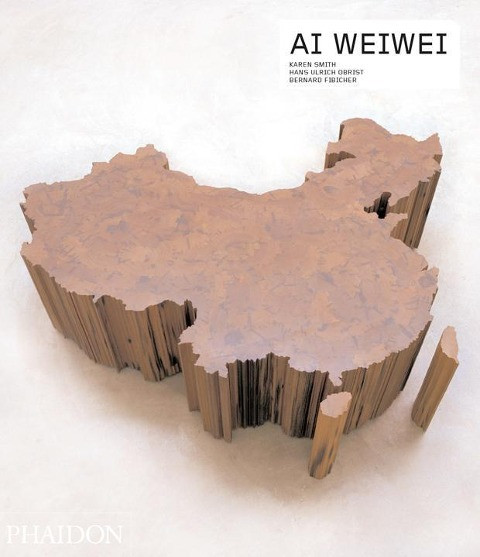
AI Weiwei
Kurzinformation
inkl. MwSt. Versandinformationen
Artikel zZt. nicht lieferbar
Artikel zZt. nicht lieferbar

Beschreibung
Ai Weiwei (b. 1957) is truly an artist for the twenty-first century. In his sculptures he refashions artefacts and antiques into surprising, sometimes monumental constructions such as Template (2007): hundreds of wooden doors and windows taken from demolished Ming and Qing dynasty temples and arranged into a massive outdoor sculpture. As much as these materials look to the past, they also speak of the present, because never before (and probably never again) have they been available in such abundance. Like his benches carved from centuries-old temple beams, Template is a sly commentary on the speed with which China's building boom is obliterating its past. (When Template collapsed in a rainstorm two weeks after its unveiling at Documenta 12, the artist embraced its demise as a clever artistic twist.)
In China today, making art that's critical of current cultural and economic policies is not a particularly safe career move. But Ai's father, the poet Ai Qing, walked a similar path, absorbing European avant-garde styles while studying in 1930s Paris and later standing by them in the face of Communist opposition, a move that eventually led to his exile to the distant provincial town where his son Weiwei came to be born and raised. In the late 1970s Ai Weiwei moved to Beijing, banding together with other pro-democracy artists in a loose collective known as the Stars Group. In 1981, following government retaliation against one of their exhibitions, Ai moved to New York, where he attended art school and lived the life of the bohemian for twelve years, his East Village apartment serving as a base for countless visiting Chinese artists. When his father became ill in 1993 Ai returned to China, settling in Beijing and finally taking up his art career in earnest.
Weiwei's artistic forebears belong primarily to the Western modernist avant-garde (Duchamp and Beuys are particularly relevant). But Ai has equally and increasingly been influenced by modernist architecture and contemporary urban planning, citing the need for an ideal for living in a country where runaway economic development has shown little regard for the everyday life of the individual. In stark contrast to the glass-and-steel high-rises going up around Beijing, the art galleries, ateliers and homes Ai designs are boxy and modest, made from brick and other vernacular materials. Their resolution of Eastern and Western styles is a fitting parallel to his antique readymade sculptures.
What truly marks out Ai as a twenty-first century artist is the multiplicity of his roles: not just artist, designer and architect but also curator, publisher, web blogger and compass for an entire generation of Beijing artists. He has been described more than once as the Chinese Warhol, overseeing a factory-like studio (Fake) with dozens of assistants engaged in countless projects in a range of disciplines. And indeed his outsize public persona is an inseparable part of his art. It should come as no surprise that when Herzog & de Meuron came to Beijing to conceive of a new stadium for the 2008 Olympics, Ai was the one who provided them with a design concept: an interlaced form based on the woven baskets his wife collects at local antique markets.
At a time when the West is finally discovering Chinese contemporary art, Ai is one of the few to have transcended the label 'Chinese artist'. In part thanks to his gallery Urs Meile (Lucerne and Beijing), Ai has won the support of strong European collectors. His work is increasingly being shown at major venues around the world (Kunsthalle Bern, Kunsthaus Graz, Tate Liverpool) and included in major international exhibitions (the Moscow Biennial, the Guangzhou Triennale, Documenta). A complex, multi-faceted artist, Ai is poised to make a deep impact on contemporary art far beyond China's borders.
Ai Weiwei is represented by Galerie Urs Meile, Lucerne and Beijing.
von Fibicher, Bernard;Obrist, Hans Ulrich;
Produktdetails

So garantieren wir Dir zu jeder Zeit Premiumqualität.
Über den Autor
Karen Smith is a curator and writer based in Beijing. Hans Ulrich Obrist is Co-Director of Exhibitions and Programmes and Director of International Projects at the Serpentine Gallery, London. Bernard Fibicher is Director of the Musée Cantonal des Beaux Art in Lausanne.

- Hardcover
- 247 Seiten
- Erschienen 2024
- DISTANZ Verlag

- Hardcover
- 56 Seiten
- Erschienen 2024
- Schirmer Mosel

- Gebunden
- 216 Seiten
- Erschienen 2015
- DISTANZ

- Taschenbuch
- 144 Seiten
- Erschienen 2023
- modo

- Gebunden
- 320 Seiten
- Erschienen 2022
- modo

- Hardcover
- 272 Seiten
- Erschienen 2023
- Edition Lammerhuber

- Gebunden
- 160 Seiten
- Erschienen 2022
- Hatje Cantz Verlag

- Taschenbuch
- 400 Seiten
- Erschienen 2009
- Da Capo Lifelong Books

- hardcover
- 152 Seiten
- Erschienen 2003
- Goetz, Ingvild

- Gebunden
- 112 Seiten
- Erschienen 2021
- DISTANZ Verlag

- Hardcover
- 400 Seiten
- Erschienen 2014
- Hirmer

- Klappenbroschur
- 184 Seiten
- Erschienen 2023
- Hatje Cantz Verlag

- hardcover
- 56 Seiten
- Erschienen 2000
- powerHouse Books

- perfect -
- Homburg/Saar : Beck,

- Klappenbroschur
- 528 Seiten
- Erschienen 2021
- Birkhäuser

- Hardcover
- 95 Seiten
- Erschienen 2011
- Sandstein Kommunikation




 bestellen
bestellen






















